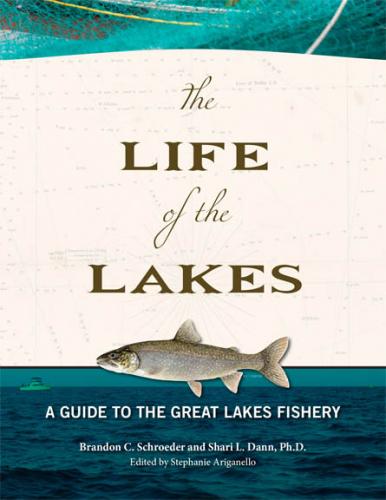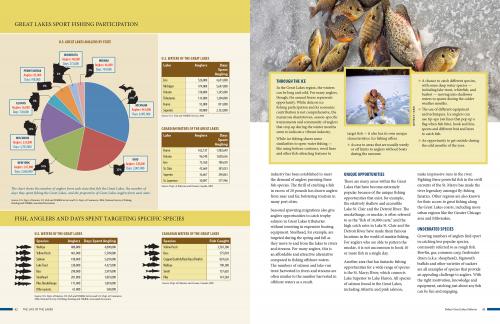Michigan Sea Grant publication explores “The Life of the Lakes”
Michigan Sea Grant’s updated third edition of The Life of the Lakes: A Guide to the Great Lakes Fishery offers a look at the colorful story of our Great Lakes.
The Great Lakes fishery offers a binding thread by which to explore the culture, economy and ecology of the lakes through time. Michigan Sea Grant’s third edition of The Life of the Lakes: A Guide to the Great Lakes Fishery celebrates this diverse, dynamic and valuable Great lakes fishery. This book offers a reader-friendly opportunity to: 
- Learn more about the basic biology of fish and ecology of the Great Lakes ecosystem.
- Walk through history to learn how our fishery has changed over time, in response to environmental, social and technological changes.
- Look forward in exploring future issues and opportunities facing our Great Lakes fishery.
Through four colorful chapters, this publication explores: Ecology and Management, Today’s Great Lakes Fisheries, History of the Great Lakes Fisheries and the Future of these resources. Through The Life of the Lakes, we can more deeply explore:
Great Lakes Ecology: The Great Lakes are an amazing resource with more than 11,000 miles of shoreline and about 20 percent of world’s surface freshwater. Great Lakes ecosystems offer a diversity of habitats from coastal wetlands to inland rivers and nearshore to offshore waters, which support abundance and diversity in life. Nearly 180 different species of fish swim in the Great Lakes and Michigan waters, including the many species of fish we value in recreation and food. Ecologically, these species represent a diverse and dynamic aquatic system of life, from baitfish to master angler predator fish.
- History of our Fishery: Explore the social, technological, and environmental changes that have influenced our fishery throughout history. Taken together, those changes make today’s Great Lakes fisheries quite different than they were hundreds of years ago. Our fisheries’ history and heritage helps us better understand the fishery of today, and offers a window to our future as we still wrestle with many of the same issues as in the past – such as protecting water quality, understanding ecosystem changes, and managing fish resources for a diversity of users and values.
- Fisheries of Today: Great Lakes fish and fishing – such as tribal, commercial, and recreational fishing – have been instrumental in shaping the culture, economy, and quality of life and people in the Great Lakes region. Today, approximately 1.5 million recreational anglers spend nearly 18 million days fishing U.S. waters of the Great Lakes, targeting species from salmon and lake trout to walleye and bass. These same Great Lakes waters produce nearly 50 million pounds of food fish, including the tasty whitefish, through sustainable commercial fishing operations around the region.
- Fisheries of the Future: Explores challenges and opportunities of our fishery into the future. The past, current and emerging issues affecting the Great Lakes will ultimately define the future of the Great Lakes fisheries. Understanding and adapting to habitat and ecosystem changes, shaping sustainable fisheries policy and management decisions related to fisheries and engaging and involving citizen stakeholders will drive how the Great Lakes
 fisheries looks to the future.
fisheries looks to the future.
The Great Lakes fisheries are part of our history and heritage, and still a part of who we are today. Our Great Lakes fishery looks differently today than in the past, and changes and continuing challenges will face our fishery into the future. Yet, despite change, these amazing resources remain as socially, economically, and ecological valuable as they have been through time. The Life of the Lakes offers a wealth of information and opportunity to explore this diverse and amazing Great Lakes fishery.
A recent edition of Michigan Sea Grant’s Upwellings newsletter offers an in depth preview of the Life of the Lakes. You may visit the Michigan Sea Grant Bookstore, where you can order your copy of The Life of the Lakes today. Discounts for educators and for bulk orders are available by contacting the Michigan Sea Grant Bookstore at 734.763.1437 or via email for more details.



 Print
Print Email
Email

